Daughters of the Dust Blu-ray Movie
HomeDaughters of the Dust Blu-ray Movie 
Cohen Media Group | 1991 | 112 min | Rated PG | Apr 11, 2017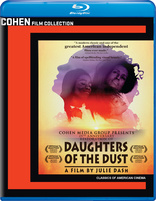
Movie rating
6.7 | / 10 |
Blu-ray rating
| Users | 0.0 | |
| Reviewer | 4.5 | |
| Overall | 4.5 |
Overview
Daughters of the Dust (1991)
The story of three generations of Gullah women in the Peazant family on St. Helena Island in 1902 as they prepare to migrate to the North.
Starring: Barbarao, Bahni Turpin, Cheryl Lynn Bruce, Tommy Redmond Hicks, Tony King (I)Director: Julie Dash
| Drama | 100% |
| Romance | 16% |
Specifications
Video
Video codec: MPEG-4 AVC
Video resolution: 1080p
Aspect ratio: 1.85:1
Original aspect ratio: 1.85:1
Audio
English: LPCM 2.0
Subtitles
English SDH
Discs
50GB Blu-ray Disc
Two-disc set (2 BDs)
Playback
Region A (B, C untested)
Review
Rating summary
| Movie | 4.5 | |
| Video | 5.0 | |
| Audio | 4.0 | |
| Extras | 3.5 | |
| Overall | 4.5 |
Daughters of the Dust Blu-ray Movie Review
Exodus.
Reviewed by Jeffrey Kauffman April 4, 2017Ava DuVernay has received quite a bit of press over the past few years for being the “first African American female” this or that in the film business. Middle of Nowhere garnered DuVernay the first ever Best Director award given at Sundance to an African American female director, and Selma led to two historic “first ever” nominations, a Golden Globe nomination for Best Director for DuVernay herself, and an Academy Award nomination for Best Picture (the first time a film directed by an African American female had achieved that feat, despite the fact that DuVernay was overlooked for an Oscar nod for directing). Now DuVernay is attached to the upcoming film adaptation of Madeleine L’Engle’s classic A Wrinkle in Time, with a budget that is reportedly the largest ever to be granted an African American female director. It’s perhaps instructive to realize, then, that it wasn’t really all that long ago that another African American female director, Julie Dash, was making history of her own and in fact blazing the trail for followers like DuVernay. Dash’s landmark film Daughters of the Dust was in 1991 the first feature length film helmed by an African American woman to gain a wide theatrical release. It’s notable that Dash didn’t just direct this elegiac depiction of Gullah Islanders, she also wrote and co-produced it, offering an impeccably rich and nuanced view of a culture that few “outsiders” have ever even known about, let alone experienced. Dash’s own father was a Gullah Islander, something that may have provided some atavistic motivation for the making of Daughters of the Dust, despite the fact that Dash as a child was only initially tangentially aware of the unusual cultural influences that were part of her upbringing.
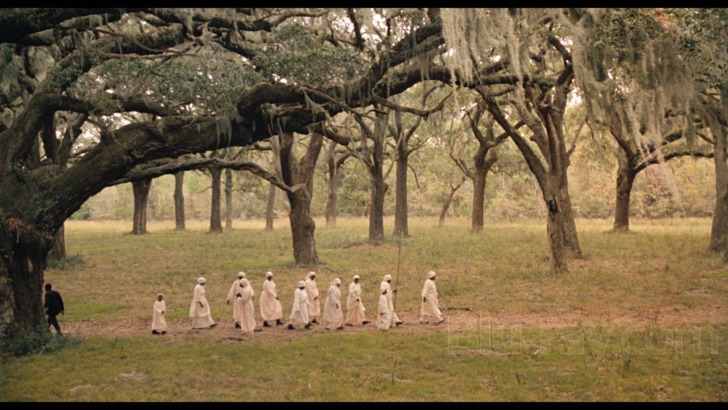
In the commentary included on this new two disc Blu-ray set as a supplement, Dash mentions how at one point she considered making Daughters of the Dust a silent film, and the film is indeed relatively free of long dialogue sequences, relying instead on the sumptuous cinematography of Arthur Jafa, who won Sundance’s prize for his efforts when the film screened there in 1991. (Jafa and Dash were evidently a couple at one point.) The film opens with lush shots of Saint Helena Island off the South Carolina coast, an isolated area where slaves, divorced from mainland influences, basically formed their own culture, including customs and language, over the course of their captivity, something they passed down to their descendants once slavery was abolished. Daughters of the Dust takes place in the first years of the 20th century, when more epochal changes are occurring to the “native” Gullah population.
Despite its almost anthropological recreation of the Gullah culture, Daughters of the Dust also indulges in a bit of magical realism, especially in its structural artifice whereby a so-called Unborn Child (Kay-Lynn Warren) both narrates and (later) “appears” in some scenes. Unborn Child is the progeny of Eula Peazant (Alva Rogers), an islander whose visit to the mainland resulted in a rape which may or may not have resulted in the yet to be born child. That has led to a certain amount of angst on the part of Eula’s husband Eli (Adisa Anderson), who is similarly conflicted about whether life on the island is preferable to more modern ways on the mainland.
Perhaps suprisingly, there isn’t the generational divide in terms of who wants to stay and who wants to go as the story develops, though it’s undeniable that family matriarch Nana (Cora Lee Day) is a champion of the “old ways” and therefore fairly immovable. Visitors Viola (Cheryl Lynn Bruce), who has already moved up north and become a pretty rabid Christian, and Yellow Mary (Barbara-O), another expat who has made her money as a "working girl", offer different takes on the maxim that you can't go home again. In her depictions of all the characters, Dash does a really elegant job of delivering some really potent information in some unexpected ways. Note, for example, how she alludes to slavery by having several of the islanders’ hands permanently dyed by indigo, which according to Dash’s commentary was an industry that pre-dated cotton picking. There’s also the perhaps unsubtle use of a masthead off of a slave ship which is rotting in a nearby body of water that several characters either walk by or actually interact with.
The film’s recreation of a really fascinating blend of different cultural influences creates an almost mesmerizing spell at times, with characters exhibiting ritualistic behaviors which are odd but compelling. The fact that the island is home to both Muslims and Native Americans also makes this a really unexpectedly fascinating study in early 20th century multiculturalism, with the added subtext that the Gullahs themselves are inherently multicultural. Dash’s decision to place all of this in the context of the first (or second) generation after the abolishment of slavery lends a really visceral underpinning to seemingly mundane activities.
Considering how assured and emotionally nuanced so much of Daughters of the Dust is, it’s actually a little shocking that Julie Dash hasn’t been more celebrated in the world of film, though as some of the supplements make clear, she is certainly recognized and perhaps even lionized in the subset of African American women directors (a small but at least growing aggregation). There’s a recurring motif in Daughters of the Dust of remembering where you came from, and it might be politic of today’s movers and shakers like Ava DuVernay to remember that without efforts like this one of Julie Dash’s, career paths for African American female directors would not be nearly so well marked.
Daughters of the Dust Blu-ray Movie, Video Quality 
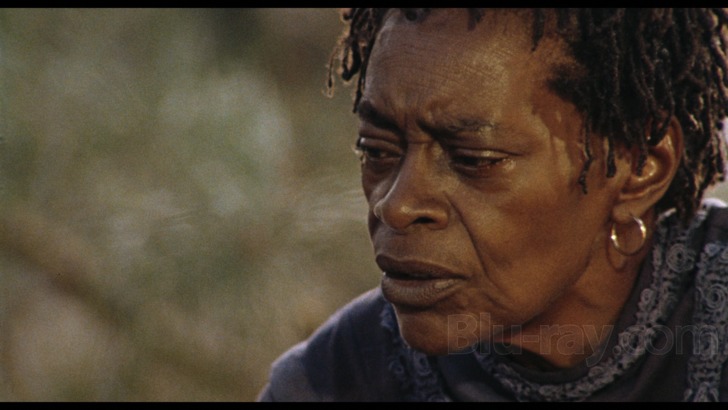
Daughters of the Dust is presented on Blu-ray courtesy of Cohen Media Group with an AVC encoded 1080p transfer in 1.85:1. The film was restored by Cohen in conjunction with UCLA for the film's 25th anniversary, and the results are really spectacular looking. Arthur Jafa's lush cinematography is rendered beautifully here, with a nicely suffused recreation of the palette and a natural and organic looking resolution of grain structure. The film has a rather gorgeously burnished look a lot of the time, with the darker skin tones contrasting elegantly with what are often pure white outfits. Fine detail is commendable in the many close-ups, though occasionally some of the midrange shots and wide shots (especially those on the beach) are just a tad soft looking, perhaps due at least in part to lighting sources. The film utilizes quite a few optical dissolves, which understandably lead to a (minimal) loss of detail and a slight spike in grain. Some brief use of old archival footage (which is arguably unnecessary) looks pretty ragged, as should be expected (see screenshot 9). There are some very slight and brief, almost imperceptible, density fluctuations, but overall this is a really great looking presentation that should easily please ardent videophiles.
Daughters of the Dust Blu-ray Movie, Audio Quality 
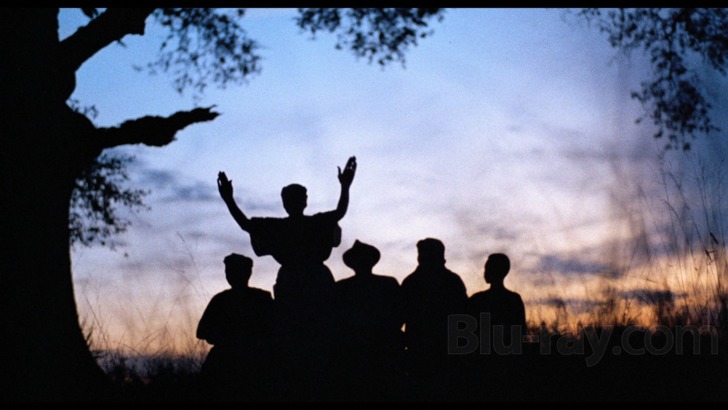
Daughters of the Dust features a nice sounding LPCM 2.0 track, one which supports the film's kind of sparse dialogue very well, while also providing ample foundation for a really remarkable score by John Barnes which incorporates a rather wide range of music types and which resonates quite winningly throughout the audio presentation (it's actually a little shocking to me that no soundtrack album was ever released, at least according to some cursory research I did in preparation for this review). Ambient environmental effects are also rendered realistically on this problem free track.
Daughters of the Dust Blu-ray Movie, Special Features and Extras 
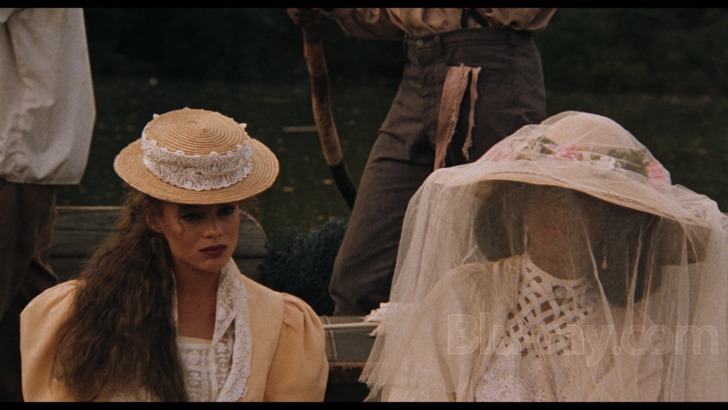
Disc One
- Audio Commentary with Director Julie Dash and Michelle Materre
- Interview with Julie Dash and Dr. Stephane Dunn, Director of Cinema, Television and Emerging Media Studies at Morehouse College (1080p; 1:12:08) is a far reaching discussion which has some interesting comments from Dash about the research she did for the film.
- Q & A with Director Julie Dash and Cheryl Lynn Bruce at the Chicago International Film Festival, Moderated by Actress Regina Taylor (1080p; 24:51) is another really interesting interview, with Dash celebrating some of the women directors who influenced her.
- Interview with Cinematographer Arthur Jafa(1080p; 25:23) offers a congenial Jafa discussing his matriculation into film from the world of architecture.
- 2016 Re-Release Trailer (1080p; 1:35)
Daughters of the Dust Blu-ray Movie, Overall Score and Recommendation 
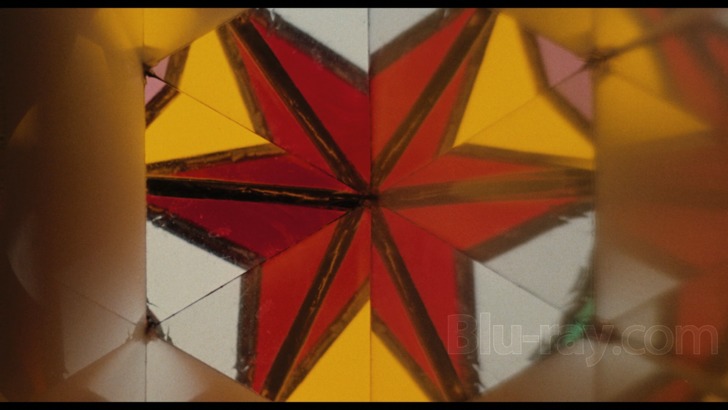
What an incredibly interesting and moving film Daughters of the Dust is. The backstory here with regard to Dash's own heritage and then her ability to get this film made and pushed into wide release is also fascinating, but the film itself is something of a treasure and should certainly be enjoyed by anyone who likes a novelistic approach to an unusual subject matter. Technical merits are top notch and Daughters of the Dust comes Highly recommended.
Similar titles
Similar titles you might also like

Zama
2017

Rust and Bone
De rouille et d'os
2012

A Tale of Summer
Conte d'été / A Summer's Tale
1996

Touki Bouki
1973

Waves
2019

24 Frames
2017

Portrait of a Lady on Fire
Portrait de la jeune fille en feu
2019

Flashbacks of a Fool
2008

Aquarius
2016

Beau Travail
1999

La Dolce Vita
1960

Roma
2018

The Red Squirrel
La ardilla roja
1993

Maborosi
幻の光 / Maboroshi no hikari
1995

Leviathan
Левиафан / Leviafan
2014

Nights in Rodanthe
2008

The Club
El Club
2015

Mustang
2015

Model Shop
Limited Edition to 3000
1969

Stromboli
Stromboli, terra di Dio
1950